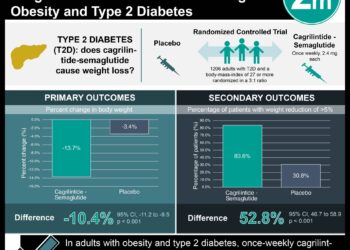Genetic variants of increased waist-to-hip ratios associated with diabetes and coronary disease
1. A polygenic risk score for increased waist-to-hip ratio (WHR) was developed from over 200 risk loci.
2. Polygenic risk scores for higher WHR were significantly associated with higher risk of cardiometabolic disease, type 2 diabetes, and coronary disease, even when accounting for increased abdominal fat.
Evidence Rating Level: 2 (Good)
Study Rundown: Body fat distribution, usually measured as waist-to-hip ratio (WHR), is an important contributor to cardiometabolic disease independent of body mass index (BMI). Genetic contributions to WHR are likely to confer increased risk for other cardiometabolic diseases, though these associations have yet to be clearly identified. In this retrospective cohort study, over 200 genetic loci were identified as being associated with increased WHR as well as increased visceral abdominal fat to gluteofemoral fat ratio. The polygenic risk score also conferred greater risk of cardiometabolic disease, type 2 diabetes, and coronary disease. This association remained significant even when accounting for abdominal fat mass, suggesting that lower gluteofemoral fat may be also confer risk of cardiometabolic disease.
While previous studies have demonstrated the risk of higher levels of abdominal fat for cardiac risk, this study shows a possible independent role of the relative inability to expand the gluteofemoral fat compartment. Still, the study has numerous limitations. Most notably, this study was retrospective and involved a relatively homogenous population of European ancestry, increasing potential confounders and reducing generalizability.
Click to read the study, published today in JAMA
Relevant Reading: Waist, neck circumferences, waist-to-hip ratio: Which is the best cardiometabolic risk marker in women with severe obesity? The SOON cohort
In-Depth [retrospective cohort]: In the Genetic Investigation of Anthropometric Traits (GIANT) study, 202 loci for increased BMI-adjusted WHR were identified from over 2.4 million possible loci. A polygenic risk score was derived from these loci and applied to 452,302 participants of European ancestry from the UK Biobank. In 636,607 people, the 202-variant polygenic score for higher WHR was associated with higher odds of type 2 diabetes and coronary disease and an unfavorable cardiometabolic profile (p < 0.05). The hip-specific polygenic score had a statistically larger association estimate for diabetes (Odds Ratio 2.54; CI95 2.17 to 2.96) than the waist-specific polygenic score per 1-SD increase in BMI-adjusted WHR (1.57; CI95 1.34-1.83). Multivariable analysis suggested that the polygenic risk score was still significantly associated with increased risk of diabetes and coronary disease even when accounting for waist circumference and visceral abdominal fat mass.
Image: PD
©2018 2 Minute Medicine, Inc. All rights reserved. No works may be reproduced without expressed written consent from 2 Minute Medicine, Inc. Inquire about licensing here. No article should be construed as medical advice and is not intended as such by the authors or by 2 Minute Medicine, Inc.







